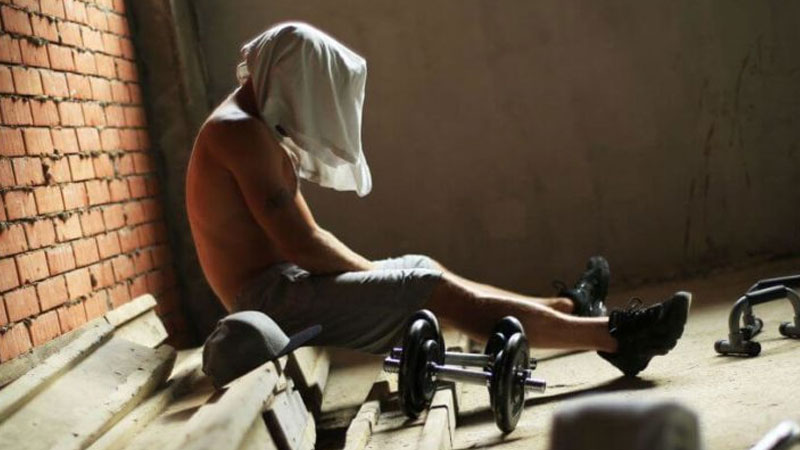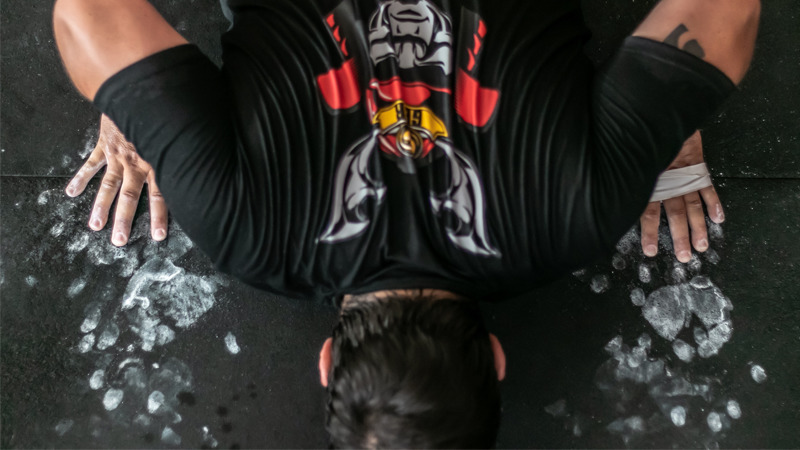
If you’re concerned that you’re overtraining and your performance or progress is starting to suffer, read this article and get back on the gains train.
Bottom line, very few people end up overtraining.
Even pro athletes rarely end up so far down the rabbit hole that they can be diagnosed with chronic overtraining syndrome.
But for some reason it’s become an excuse and buzzword for pussies that think training hard for a week will somehow break their physiology and push them down the wormhole of muscle loss and illness.
But overtraining DOES exist!
If you’re a guy who’s training like a muthaf*cker on the regular and starting to suffer a loss of muscle, strength or fitness, you might well be on the slippery slope to overtraining.
With more and more intense methods of training coming out of the woodwork (hello CrossFit) and the ongoing pressure to look your best, you might be pushing just that bit too far.
If you want to stop just training hard and start training clever, give this article a read.
The basics of training load
To make progress in the gym you have to get out of your comfort zone.
One of the fundamental factors in getting fitter, leaner and stronger is progressive overload. This just means that you challenge your body in each workout with use a training stimulus that you’re unaccustomed to.
You can do this using heavier weights, thrashing out more reps and sets, running faster or anything else that pushes the boundaries of your abilities.
When you implement progressive overload, you add a physical stress to your body. The more frequently you smack yourself around the face with overload, the more your body fights back.
And it does this by adapting.
Up your training to make more gains
When you lift weights your body adapts by growing new muscle cells and getting you jacked. When you push for a new race time your body adapts by optimizing its aerobic response. And when you do loads of stretching you get more flexible.
No matter what you throw at it, your body adapts to the stimulus that’s placed up on it.
Coaches often call the period of training where you push hard during training a ‘functional overreaching’ phase.
This comes from the fact that you are ‘reaching’ out of your comfort zone to generate improvements
And ‘functional’ because it has value and purpose.
[infobox]Bro Point: Physical adaptations occur when training load is progressed, allowing for gradual improvements in athletic performance.
[/infobox]Balancing training load with recovery is really important
Constantly battering your body with workout after workout is pretty taxing.
You’re literally damaging your tissue when you hit the gym – and without the opportunity to recover and restore, you’ll never fully adapt, grow and improve.
One of the biggest limiting factors in how well and how quick you get jacked is your ability to tolerate strenuous training over periods of time. Tolerance is different in everyone so it makes it difficult to say exactly how long someone should go without a recovery period.
It’s easy to go hell for leather, smashing the gym every day at a million miles per hour. But at some point your body will want to fight back and tell you it needs to chill.
Pushing hard for a few weeks at a time is important to get that stimulus for strength or muscle growth. But you have to ease off every now and then and allow the natural process of adaptation to occur.
But…
If training load is high and recovery is a distant thought at the back of your mind for too long you’ll begin to see some negative side effects.
And that’s where overtraining comes in…

What is Overtraining?
Overtraining, in the most simple terms, is a loss in performance that takes weeks to months to recover from.
You don’t just wake up one morning and realize you’re overtrained. It’s a gradual thing that takes time and follows a sequence of events with huge f*ck you warning signs.
Refusing to take your foot off the gas
If you’re training to the point of functional overreaching, and then put in a rest phase, you’ll adapt quickly.
This is pretty much perfect training.
If you continue to push your body without rest you’ll transition into a phase called non-functional overreaching. This should be seen as a red flag and a warning that you really need to take a week or so off training so hard.
If you don’t rest at this stage of overreaching you’ll quickly suffer a loss of performance that’ll take you a good couple of weeks, maybe even longer, to recover from.
You’re still not overtraining at this point, but you’re edging ever closer.
If you continue to be a complete jackass at this point and still refuse to take a break from training, you’ll end up suffering from overtraining syndrome.
Chances are, you’re not overtraining. But it’s not impossible
Let’s be clear right from the get go.
Overtraining doesn’t just ‘happen’. As you’ve seen above, it involved a sliding scale of:
Progressive overload > functional overreaching > non-functional overreaching > overtraining > death (we made that last one up)
Your body can repair muscle damage in less than a couple of days, and even if you train 4 days per week with no weeks off you’ll be able to adapt quite well for a pretty long time without any huge side effects.
But when we talk about overtraining we’re talking about severe, chronic and long-lasting reductions in strength or performance for several weeks to months.
Not a day. Not a few days. Not even a week. We’re talking months.
No matter how hard you try, you just can’t recover. And unfortunately it comes with an absolute sh*t ton of side effects and symptoms too…
[infobox]Bro Point: You don’t just stumble into overtraining. It takes a while to transition into overreaching and then finally overtraining. But even then, most people wont train hard enough or long enough to get anywhere near full-blown overtraining.
[/infobox]
Overtraining and Workout Fatigue Symptoms. How Can You Tell?
The problem with overtraining is that it’s a syndrome. This means that there’s no one single cause and no one single test you can use to diagnose it.
What makes things worse is that while there are hundreds of case studies, research papers and clinical papers on endurance athletes, there’s pretty much minimal research on overtraining caused by strength training.
This means that if you wanted to get all white coat lab nerd about it, it’s actually quite hard to say with confidence what happens when you overtrain from strength training (in comparison to endurance training anyway).
But what tends to happen when you overtrain is a range of different fatigue symptoms that affect different parts of your body.
Here’s a breakdown of the main symptoms:
Physiological performance changes
Your body has a way of telling you when enough is enough and it needs to slow down and recover. Some of the simplest and easiest ways to tell if you’re overtraining is to analyze your autonomic functions.
If you are overreaching or overtraining, the following will happen:
- Resting heart rate will be elevated (and in some cases decreases too).
- Your ability to reach your max heart rate and max oxygen uptake will be reduced.
- Heart rate recovery is longer.
- There’s a change to what’s known as heart rate variability. This is basically the variance between heart beats.
- Your one rep max will decrease.
- You’ll suffer a drop in power, affecting everything from vertical jump to grip strength.
- Muscle mass and relative strength drops.
Your immune system is shot
If you find that you’re picking up illnesses such as a sore throat or a common cold more regularly, you could be overtraining. Chronic exercise has been shown to decrease white blood cell counts and even stored glutamine levels.
There’s a clear link between those that are overtrained and the risk of upper respiratory tract infections, so if you’re always feeling unwell, check your training.
Your hormones are all over the place
We all know that testosterone is important for muscle gains, strength and general badassness. But when you shift into overtraining your testosterone levels fall quicker than Lindsay Lohan’s career (and panties).
Not only that, but another hormone called cortisol starts to increase.
And when testosterone drops but cortisol goes up you’re going to start losing gains real fast. You’ll feel in constant fatigue, unable to hit your normal maxes and you’ll be pretty much laid in the fetal position crying like a little bitch.
You’re sore all of the time
One sure fire symptom of overtraining is constant muscle aches and soreness. When you don’t recover enough, a number of inflammatory markers start to bubble under the surface.
And these can lead to a feeling of DOMS for days and days on end.
Not pleasant!
Your motivation and mood changes
Overtraining isn’t just about the physical changes, but the psychological symptoms too. After all, You’ve overtrained because you’ve hit your body with loads of stress for a long period of time.
You body is telling you that you need to take your foot off the gas by making you as unmotivated as possible. Not only that, you’ll feel like you’ve got no energy, stressed out, tense and depressed all the time too.
How to Avoid Overtraining
We’ve already mentioned that overtraining is a chronic condition that comes about after long periods of hard work in the gym without rest.
The single best way to avoid it is to either schedule recovery weeks into your program every 4-6 weeks, or to take a few days off every now and then if you feel like you’re not your usual self.
Get more sleep, follow a healthy lifestyle by being active but eating as healthily as possible (a calorie surplus helps), reduce daily stress and adjust your training load too.
That way you’ll avoid overtraining and build those goddamn beautiful gains instead.






